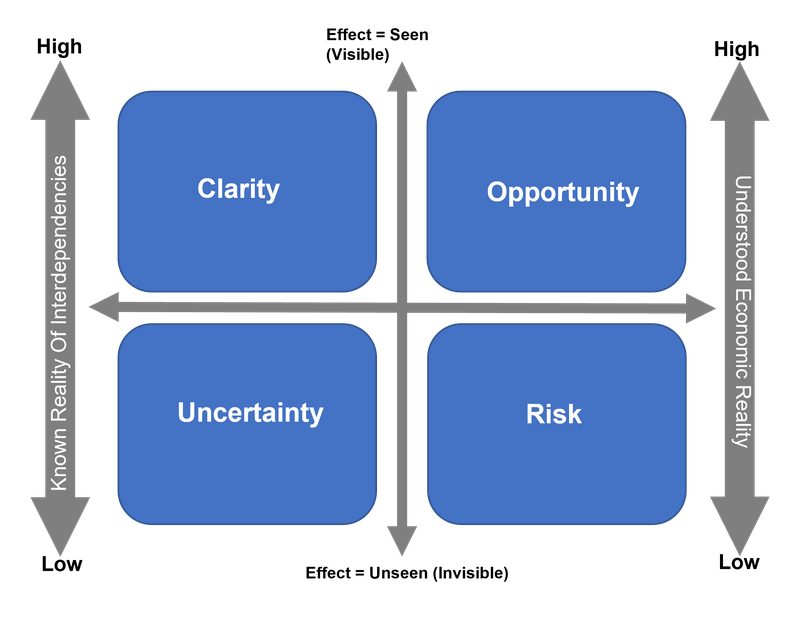ESG, And Net-Zero. Whose Truth?
Tuesday, 14 March 2023By Christopher Gleadle

“Risk comes from not knowing what you’re doing.” Warren Buffet, 1994
While human knowledge has grown immeasurably over the last hundred years, tackling the causes and effects from the multiple complex issues associated with climate, societies, and all in between, appears evermore distant. Yet, the interdependence of these complex issues negatively impact upon financial and social value. It follows, in a world where knowledge determines value in the job market, there is a suggestion of something wrong with the connectivity between pools of knowledge and its application.
Systems Can Only Be Isolated Imperfectly.
Complexity is a problem in many fields of finance. Yet the prevailing deterministic management of decision making that identifies linear cause and effect leads to complexity exposing limits on the use of current knowledge.
It follows, despite ESG models (that contain bias etc), financial markets continue to be blind-sided from aspects of the world of missed opportunity and risk. For example, when modelling assumptions are made, such as 3+2 being the same as 2+3. This assumption does not allow for the groupings and relationship between the properties of the numbers, the ways in which they are related to one another and how they can be used in the real world1.
This suggests advancing knowledge on risk and opportunity is reliant upon reducing the level of incompleteness. For example, taking a multidimensional view that sees the interdependent components of a wider system that includes natural, technical, and human structures and how they influence one another to create a different form from that of the individual parts. For example, the wetness of water cannot be understood in terms of hydrogen and oxygen.
To illustrate, imagine someone who has spent their whole life from birth living in a room where the environment of that room is black, white, and grey. Now, imagine she has spent her whole life studying the science of colour. She learns how different wavelengths of light are perceived by the eye, how a prism separates white light into a spectrum and so on. In contrast to her studying she has never personally seen anything other than shades of black and white.
Now imagine she leaves that room for the first time and sees the wonderous palette of the real world. At that moment, she surely will learn something new about colour.2 Thus there are types of knowledge that can’t be gained by reading, measuring, or deducing but have to be gained by direct experience. The sharing of someone else’s’ experiences has consequences.3
Surfaces & Boundaries
The decisions we make are based upon our past experience, social cues, bias and so on…4
To explore this thought, let us consider that in our physical world, when we see or sense anything, we only ever sense the surface, and the boundaries: we never truly sense what is beneath the surface; except perhaps in subtle ways, such as when poor quality is misrepresented as good, leaving a less than positive experience.5
If we try to see what is beneath the surface, we cut that thing open, and in so doing we create new surfaces. Likewise, if we expand out, we again look for the surfaces, the boundaries, within which everything is contained. We don’t look for how the separate components interact and affect one another. We seek to understand how the parts operate by reducing down and giving individual things laser like attention. By this we lose sight of the whole despite using terms such as holistic, which has become a variable since it is likely my whole and your whole being two separate realities. For example, the latest trend of transition financing. A linear idea, based upon experience, but being applied to a systemic problem. As a result, it fails to appreciate capital efficiency and sub-optimises returns to all stakeholders.
When Logic May Be Flawed
Logic flows through all human knowledge. We assume that we can build a sequence of facts into systematic flow of thought. But where does that leave us?
Consider the sorites paradox, a thought experiment attributed to Eubulides of Miletus. It involves a heap of sand from which grains of sand are removed one at a time. Working on the assumption that to remove a single grain of sand does not cause the heap of sand to become a non-heap of sand, the paradox considers after the process is repeated enough times to a point when only one grain of sand remains, is it still a heap of sand? If it is no longer a heap of sand, at what point did its state change from heap to non-heap?
Paradoxes6 start with a premise that appears true, then apply reasoning that too appears true, but we end up with a false or contradictory conclusion. As a result, we are forced to rethink what we know. For example, one solution to the sorites paradox is to admit that terms are sometimes too vague to be useful. Or as appears more common today, different degrees of truth – my truth, your truth. When removing grains of sand from the heap, it’s still a heap, but not as much of a heap as it was before.
A practical example within today’s digital age could be “when information is plentiful, we often use it not to make better decisions based on the intrinsic characteristics of a situation, but rather imitate others and their mistakes.7” Consequently, when information is received from many sources, be it scientific, regulatory, commercial, or other, decisions get made in a linear fashion8 and compromises find the lowest common denominator. Even scientists can wildly disagree! The result is ever-relentless numbers of crises.
Improving Communication
To communicate a series of random events, there is needed a lot of information, since there is no structure to the message. Its random. Shannon entropy measures this fundamental constraint.9
The term “entropy” is borrowed from physics, where entropy is a measure of disorder and in a comparable manner there are a great many possibilities for how its information can be arranged10

Fig 1: Uncertainty and Entropy, C Gleadle, 2015
Equally, we can broaden our decision space (Fig 1) and induce systems thinking rather than deterministic thinking. As a result, actions toward the multidimensional effects of climate change can become optimal by making greater inclusions. Thus, we can dampen the noise of the current linear approach to sustainability, ESG and so on…We demonstrate the effect by transforming information, and its communication, in a complex adaptive system, which is determined by the functioning of the whole by now understanding the action and impact of the relationship of components rather than just the components themselves.
Financing Net-Zero
The finance sector is steeped in financial prowess and management expertise. But the inherent skills are founded on linear deterministic systems. Consequently, there is exposed an immediate need to power new skill sets that can think about complexity in a greater relational manner. But this requires new thinking, new language, and systemic leadership that employs more direct experience at the interconnection of natural, human, and technical systems. Imagine the whole and how it can be understood by considering not just the parts through linear cause and effect mechanisms but how the properties of the whole differ from the parts as a result of interdependent interaction.
It follows, to avoid the mistakes of the past11 being repeated – or even amplified into the future - a radical shift in thinking and acting must now prevail. To boost thinking that can imagine and act upon nonlinear causes and effects from multiple complex issues that may appear distant but are highly relevant to each other. Consequently, we can improve upon unintended consequence avoidance and learning lessons that could have been foreseen.
Christopher Gleadle, 2023 - www.chrisgleadle.co.uk
References
1 Naïve Modelling, C Gleadle, Pamphleteers Blog, Long Finance, 2020
2 Knowledge Argument, Mary’s Room, Frank Jackson, 1982
3 “Empirical evidence can spin off under its own momentum reflecting little of the real world” Elinor Ostrom, Governing the Commons, 1991
4 The Five Essential Steps To Sustainable Viability, C Gleadle, 2018
5 The Market For Lemons: Quality, Uncertainty And The Market mechanism, George Akerlof, 1970
6 Sustainability, ESG and the Productivity Paradox, C Gleadle, Pamphleteers Blog, April 2021
7 Eric Bonabeau, Harvard Business Review, 2004
8 The Intimacy of Investment, Risk and Waste, C Gleadle, Pamphleteers Blog, November 2022,
9 A Mathematical Theory of Communication, Claude Shannon, 1948
10 The Five Essential Steps To Sustainable Viability, C Gleadle, 2018
11 What Gets Measured Gets Managed…Oh Really? C Gleadle, FS Club, Pamphleteers Blog, April 2022